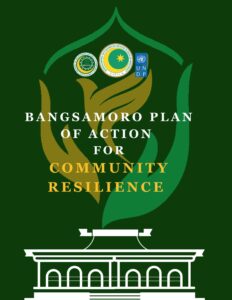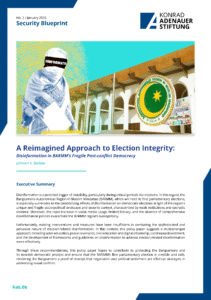DEVELOPMENT/ACTION PLANS

BANGSAMORO PLAN OF ACTION FOR COMMUNITY RESILIENCE
The Bangsamoro Plan of Action for Community Resilience (BPA-CoRe) is a strategic framework developed by the Bangsamoro Government, led by the Ministry of the Interior and Local Government (MILG), through extensive collaboration with local government units (LGUs), civil society organizations, religious leaders, the security sector, and development partners. This plan builds on the earlier Convergence Framework for Community Resilience developed in early 2020 and outlines the Bangsamoro Government’s “whole of society” strategy to build resilience against a wide range of threats. The development and enhancement of the BPA-CoRe document, via a series of provincial and sectoral consultations, was commissioned by UNDP and MILG and implemented by TFI, led by Ahmed Harris Pangcoga, Orson Sargado, and Haironessah Domado.
The BPA-CoRe addresses multidimensional risks and vulnerabilities, including conflict and violence/violent extremism, natural disasters and climate change impacts, and pandemics. Its core objectives are to implement a comprehensive, integrated, and transformative approach ; establish an inclusive, participatory, and culturally-sensitive process to effectively address all hazards ; and ensure convergence and collaboration among different actors for peace and resilience-building. The plan is guided by the comprehensive approach of Prevention, Preparedness, Response, Recovery, Adaptation, and Innovation (PPRRAI).
The framework operates on a “whole of society” approach, prioritizing convergence across all levels and sectors, and pays special attention to the needs of marginalized and vulnerable groups, such as women, youth, Indigenous Peoples (IPs), internally displaced persons (IDPs), faith-based leaders, persons with disabilities (PWDs), and former combatants. The plan organizes its efforts around three key result areas: active engagement and collaboration among the BARMM government, development partners, and the security sector; strengthened capacities of LGUs in disaster risk reduction and management and service delivery; and the empowerment of Bangsamoro communities to identify and address their resilience challenges. A resilient Bangsamoro community, as envisioned by the plan, is characterized by empowered citizens, inclusive LGUs, access to basic services, strengthened health systems, effective conflict mechanisms, and capacities for disaster mitigation and natural resource management.
DISCLAIMER: To get a copy of this document, Please Contact the Ministry of Interior and Local Government-BARMM (MILG-BARMM)
POLICY PAPERS
Published Work of TFI Experts

A Reimagined Approach to Election Integrity: Disinformation in BARMM’s Fragile Post-conflict Democracy
Co-authored by Johnson Badawi, this policy paper, published as part of the “Security Blueprint” series by the Konrad-Adenauer-Stiftung in January 2025
